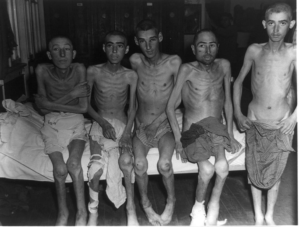This week’s blog post was inspired by a question that was posed to PrisonInsight. Since the author of the blog didn’t have any personal experience with the topic, they reached out to Mistie Vance, a current prison inmate who has been incarcerated for over a decade and won’t be eligible for parole until 2025. The two became friends while serving time together at the Women’s Eastern Reception, Diagnostic, and Correctional Center in Vandalia, Missouri. Mistie is a personal trainer and aerobics instructor who is well-versed in insider information about life in prison.

Mistie’s guest blog post will answer the question: what happens if you starve yourself in prison? She will cover a range of topics related to this issue, offering insights and information about the potential physical and mental consequences of self-starvation in a prison setting. Readers can expect to gain a better understanding of the risks and challenges that individuals face when they engage in this behavior, as well as the ways that prisons may respond to it.
- Inmate starvation is likely to go unnoticed
- Self harm is common in an institutional setting
- Negative energy is everywhere in prison
- Mistie’s personal experience with self harm
- Suicide attempts in prison
Inmate starvation is likely to go unnoticed
In Mistie Vance’s guest blog post, she notes that self-starvation in prison is likely to go unnoticed unless the individual draws attention to it. According to her, correctional officers (COs) are generally not concerned with an inmate’s physical or mental health unless it becomes a problem or an issue of liability for the prison. As long as an inmate is following the rules and not causing trouble, COs tend to consider their job done.

Mistie explains that unless an individual is on suicide watch in solitary confinement (also known as “the hole”), where their food intake is monitored, no one is likely to notice if they are not eating. She suggests that individuals who want to engage in self-starvation for attention may run around telling others about it, but this is not a common occurrence. Overall, Mistie’s observations suggest that self-starvation in prison can be a solitary and unnoticed behavior that may not be addressed unless it becomes a significant problem.
Self harm is common in an institutional setting
The institutional setting of prison can be incredibly challenging for inmates, particularly when it comes to coping with emotional distress. Many prisoners struggle to find healthy ways to deal with their pain and frustration, which can lead to self-harm practices. Without the ability to engage in physical activity or other stress-relieving activities, inmates are left to find ways to manage their emotions within the limited resources of prison life.

Living in close quarters with people of different personalities and backgrounds can also exacerbate these challenges, as conflicts and tension between inmates can arise. Overall, the lack of access to healthy coping mechanisms and the stressful nature of institutional life can make it difficult for inmates to maintain their mental and emotional wellbeing.
Negative energy is everywhere in prison
Negative energy permeates the environment, and it can be challenging to shield oneself from its effects, even on good days. In addition, there are individuals who derive pleasure from causing harm to others through lies or other malicious means. These actions bring them twisted satisfaction while inflicting pain on others.
Life is already difficult, and being separated from loved ones and unable to live out our dreams compounds the stress. Guards often harass inmates without provocation, schedules are overwhelming, and rules are petty and laughable.

Freedom of speech is a foreign concept in this environment. Half of what one wants to say could result in confinement, while the other half could lead to humiliating punishment.
Eating disorders such as anorexia and bulimia, as well as self-harm through cutting, are prevalent issues among inmates. Some individuals cope with their situation by disassociating and sleeping through their days with prescribed psych meds, while others turn to street drugs to numb their pain and boredom.
As a coping mechanism, exercise can be healthy or become excessive and addictive. Some individuals choose to stay busy as a way of avoiding dealing with their emotional pain, both inside and outside of prison. These coping strategies are an attempt to outrun the hurt that is always lurking close behind.
Mistie’s personal experience with self harm
Having personally struggled with anorexia both in and outside of prison, I understand the impact of using food as a form of control. Growing up in an abusive home and experiencing bullying at school left me feeling powerless and desperate for acceptance. Giving away my lunch money initially seemed like a solution to gain approval, but when weight loss became a factor, I became fixated on controlling my weight. This obsession dominated my life for years and was a tormenting experience.

Even after twelve years of incarceration, I sometimes find myself reverting to the same coping mechanisms I used in my youth. When faced with overwhelming situations that make me feel helpless, I can’t bring myself to eat until the situation is resolved, providing me with a sense of control when everything else feels out of my control.
During moments when the pain is unbearable, and tears seem to have no end, food is the last thing on my mind. Some coping mechanisms persist, while others may change in duration, but we all do what we can to cope and choose the lesser of the evils.
Suicide attempts in prison
Cutting is a prevalent self-destructive behavior among women in prison, often used to alleviate the overwhelming pressure of daily life. Many women cut in less noticeable places to avoid being caught, while others do it for attention. Unfortunately, suicide attempts are not uncommon, with some women attempting to slit their wrists. While I have not seen any successful attempts of this kind, I have witnessed a couple of successful suicides during my time in prison.
Prison facilities make an effort to monitor the mental health of high-risk individuals and place them in suicide cells if necessary. In these cells, food intake is monitored, and individuals are not released until they begin eating again. While prisons may not be able to watch every person who starves themselves, they will take action if a person becomes too emaciated or sick. Medical and mental health care will be provided, even if the person does not want help.

However, the best help for those struggling with unhealthy coping mechanisms is the love and support of their loved ones. It is essential to reach out and show support to incarcerated individuals, as love and acceptance can be life-changing and effective in promoting healing. Three simple words – “I love you” – can make all the difference in someone’s life.
Frequently Asked Questions
What happens if an incarcerated individual refuses to eat?
If an incarcerated individual refuses to eat, prison officials will monitor their food and water intake and offer medical and mental health care. If the person continues to refuse food, they may be placed in a suicide cell and watched closely for their own protection and the safety of others.
Can an incarcerated individual be force-fed if they refuse to eat?
Force-feeding is generally considered a form of medical treatment and is only used in extreme cases where an individual is at risk of death. However, force-feeding is controversial, and many human rights organizations consider it to be a form of torture.
What are the risks of starving yourself in prison?
Starving yourself can have severe physical and mental health consequences, including malnutrition, dehydration, and cognitive impairment. Prolonged starvation can lead to organ failure and death.
Can you die from starving yourself in prison?
Yes, prolonged starvation can lead to organ failure and death.
What support is available for incarcerated individuals struggling with unhealthy coping mechanisms?
Prisons provide medical and mental health care for incarcerated individuals who are struggling with unhealthy coping mechanisms. Additionally, the love and support of family and friends can be life-changing and effective in promoting healing.
Conclusion
Starving yourself in prison can have serious and potentially life-threatening consequences. It can lead to malnutrition, dehydration, weakened immune system, and other health issues. It is a form of self-destructive behavior that some inmates use as a coping mechanism to deal with the stress and pressure of prison life.
However, prisons do have measures in place to monitor the mental and physical health of inmates, especially those who are at high risk of self-harm. If an individual becomes too emaciated or sick, medical and mental health care will be provided, even if the person does not want help. It is important to remember that the best help for those struggling with unhealthy coping mechanisms is the love and support of their loved ones.



